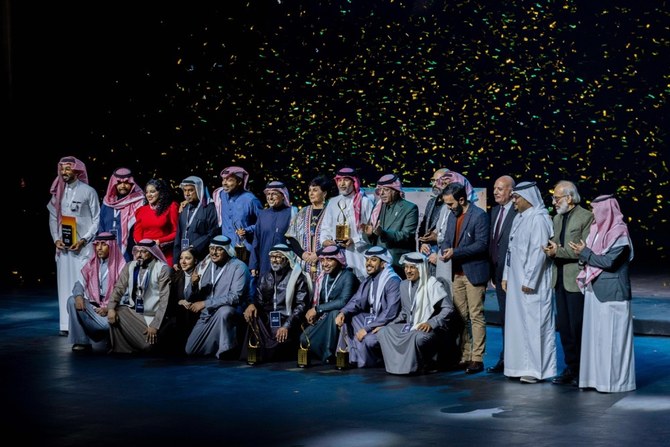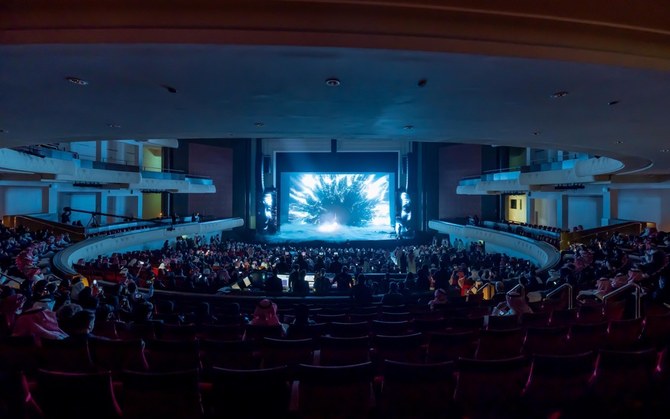RIYADH: Saudi Arabia is laying the foundations for a flourishing performing arts industry, according to a local official, as the Riyadh Theater Festival ended this week with an awards ceremony that honored local talent.
The festival, organized by Saudi Arabia’s Theater and Performing Arts Commission, was the culmination of a tour that saw 20 plays performed for local audiences across the country.
“The first Riyadh Theater Festival will constitute a new starting point for Saudi theater,” said Sultan Al-Bazei, CEO of the Theater and Performing Arts Commission.
“Showing 20 plays in eight cities for more than 100 nights means that there is interest from the audience and activity from the theater teams to produce works that are closer to the audience … and this is one of the main goals included in the strategy of the theater commission,” Al-Bazei told Arab News.
“The future of Saudi theater will be prosperous and brilliant in the near future,” he said.
Al-Bazei said greater support is now being provided for groups: “Now we have the possibility of granting theater groups a work license, and this means that the theater groups will be able to carry out their work normally, without obstacles and without the need for umbrellas to contain their activities … this makes it easier for the commission to provide support to them in all fields.”
On the significance of theater as a platform for art and creativity, in light of the Kingdom’s burgeoning cultural scene, he added: “The theatrical movement leads the arts as a laboratory for developing abilities and talents … in addition to creating stars in acting.”
He said the commission has been running regular training courses over the years to develop talent in all areas of production.
“I expect an increase in output and an improvement in the quality of performance when the activities of the Theater Academy begin, which are expected at the beginning of the coming year,” Al-Bazei said.
At the awards in Riyadh, the play “Sea” by the Al-Ahsa Culture and Arts Association Troupe, took four of the festival’s 11 honors, including for best play and best integrated show.
For “Sea,” the best music award went to Issa Al-Rasheed, Amr Al-Khamis and Ahmed Al-Muwaijd, with Shehab Al-Shehab taking the best actor category, and Sultan Al-Noah winning for best director.
For the play “Beginnings of Abandonment” by the Close Media Ensemble, Houria Ashour won for best costumes; Abdullah Dawari took the best lighting award for “Light” by the Taif Theater Troupe; Abdullah Balais for best script for “Slap” by the Kalos Ensemble; Badr Al-Hamidi for best sets for “Slap;” Khaled Al-Ruwaiei for scenography for “The Last Shadow” by the National Theater Ensemble; and Adhwa Fahad won the best actress award for her performance in “The Forbidden” by the First Leap Club Troupe.
The theater sector has seen significant growth since the launch of Saudi Vision 2030, the setting up of the commission and the establishment of the National Theater.
According to a recent report from the Ministry of Culture, during 2022 there were 427 plays of all types held across the country.
Ahmed Ismail, a literary critic, told Arab News: “The importance of theater stems from the famous saying: ‘Give me bread and a theater and I will give you great people.’ For theater is a mirror that reflects the features of society.
“Theater contributes to shaping the awareness and thoughts of its members by drawing human characters and models that resemble them, and providing them with … psychological worlds that are similar to their world.”
Ismail, who is a member of the editorial board of the Popular Arts magazine issued by the General Egyptian Book Organization, added: “Theater enhances human communication between actors and the audience through a unique artistic experience that cannot be obtained by watching the play on television or through the internet.”
“In addition, theater stimulates the individual to think critically and see things from a different perspective by presenting social and moral problems facing the play’s heroes.”
He added: “In the same context, theater raises important societal issues in an objective manner and provides solutions to them, which helps change society for the better. It also helps dialogue between different groups of society, and contributes to bringing about positive changes.”
He added that “theater is a cultural phenomenon independent of authority and governments, and it plays an important role in criticizing society and presenting its issues. It also provides the opportunity to listen to various opinions.”
The festival’s activities were held at Princess Nourah University in Riyadh, which included seminars, critical readings sessions, and a workshop on scriptwriting.
The festival honored the late Saudi Arabia playwright Mohammed Al-Othaim with an exhibition dedicated to his work.


























